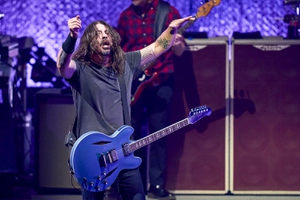O.G. Las Vegas rock star Mark Slaughter moved to Nashville more than two decades ago, but in many ways, the 52-year-old still considers this his home. “I’ll always be a Las Vegas guy, and proud of it,” he says.
Slaughter—singer for the same-named glam-metal band, best known for early-’90s hits “Up All Night” and “Fly to the Angels”—is also proud of his latest project. His second solo album, Halfway There, is set for a May 26 release on EMP label group, run by Megadeth bassist David Ellefson. We caught up with Slaughter by phone in Nashville, to catch up on the latest.
You collaborated with an old friend from Vegas, drummer Josh Eagan, on the new album. Does that mean you were back in Vegas working on it, or was it all done in Nashville? I did it all here [in Nashville] I went to high school with Josh; I was a couple of years ahead of him at Chaparral. He’s out in Los Angeles now, doing a lot of session work, and we ran into each other at a NAMM Show. We were sending tracks back and forth digitally. He knocked out the drums, and I continued with the rest of the process here in Nashville.
Sounds a lot less complicated than those old Slaughter albums must have been to make. Yeah, and I think as you mature you don’t have to sit there and go, “No, don’t do it that way, do it this way!” You know your craft, you know what somebody’s expecting and you just do that.
How long did the whole process take? Counting writing, about eight months. I also recorded four or five other songs that I didn’t put on the record, because I didn’t think they fit. I was really trying to make this a long-play record as if you were a kid listening on headphones, like in the old days. That’s really what I tried to go back to, where music was for me when I was younger.
The album and a track on it are titled Halfway There. Does that have anything to do with you turning 50 a couple years back? It is exactly that. That song is about life and how fast it goes. “Here I go, I’m halfway there.” It’s not a negative thing; it’s just a realization. It's life.
When you think back to the early days playing in Vinnie Vincent’s band or Slaughter, it probably doesn’t feel like that long ago. No, it doesn’t. I feels like it was yesterday. It does fly by. Music is the soundtrack of our lives, and it all adds up and you go, man, how did I get here?
Your voice sounds strong on the record. Has it become tough to hit the high notes as you've aged? I don’t think it’s harder, but your body’s different; it sounds different. You do age. But you just get on the bike and ride, and once you get all of the dust out of the wheels, everything’s okay.
What’s the state of Slaughter the band at this point? We do about 30 shows a year, and the rest of the guys are playing with Vince Neil, so they’re doing about 60 total. I’m also starting to do my own solo shows surrounding this album, but I don’t run from where I came from. Obviously, Slaughter is a staple, the first real rock band to come out of Las Vegas. The Killers and Imagine Dragons have come out of there, but in the early years people couldn’t believe that a band could live in Las Vegas.
When last we spoke, you were doing music for films and voice work for TV and film. Is that still the case? That stuff phases in and out. I did have an opportunity to do some voiceover work in California, and it was a major role, but I just didn’t want to live in California. There comes a point where you make those life decisions: Do I really want to sit on the freeway every day and pay high taxes and deal with getting carjacked every other week? And I was carjacked there, making one of the Slaughter records. I want a simpler thing here now, to keep my mind-set to where I’m happy and doing the things that I love.
It seems like Nashville has a been a good spot for you. It has been, in becoming a better songwriter and getting in touch with what really matters in a song.
What would you say that is? Hitting a heartstring. Writing a song that people can identify with. Some of the new album is really heavy, and some of it’s just chewing gum, but there’s more depth in a lot of the stuff than what I would have done 30 years ago. I can still do what I always did, but I’m trying to push it to a new place, too.
Living in Nashville, have you written songs with other performers in mind? I did, and then I started doing the Vegas-odds math, what a card counter would probably do: If there are 10,000 songs coming out of this city every year, and there are only 20 relevant artists [in country], there are only so many tracks they can release. I’d rather put those odds on myself than try to write for something that probably doesn’t have a shot to get on those records.
What I’m doing now is making music that, no matter what happens with it, I’m close to it. You only have so much time; what are you gonna do with it?
When I first hit play on the new record, I wondered if I’d hear some country creeping in, but that wasn’t the case. Have you ever been tempted? (Laughs.) No, I don’t have the twang. Hair has one syllable—it’s not ha-a-air. It just wouldn’t be honest. I know some people try to chase the pulse of where the industry is, but I think as an artist you just stick with what you do. Bonnie Raitt hasn’t changed, and God bless her for it. Tony Bennett sings with other people, and that’s inventive and experimental and cool. But I’m gonna do what I do and keep that integrity of being a rock guy. I have written some decent country songs, but that isn’t for a Slaughter audience.
The closing track on your album, You’re Not Here, seems pretty heavy. Is that about someone in particular? My mom, who worked at Metro [police] for years—SWAT, homicide. She moved out here to be close to us while my kids were growing up, and she was fighting cancer. I went out to do some shows, and the doctor called me and said, “You need to come home.” I came home on a Sunday, and she was still lucid, and we went into a room and I watched her take her last breath. And that’s the first line of that song: “I watched you take your last breath tonight.”
It is very personal, but it’s very honest and very true to life. To live life you have to confront that, and acknowledge the passing. Spiritually, my mom is certainly still around, but there are points when you’re just missing that person. There are times when you just feel alone, and that’s what that song is about.
It feels like you were going for something pretty epic on “Disposable,” with its strings and children’s voices. I think everybody has this point where they say, “I’m more than that.” And that song is saying, “I’m not disposable, I’m not second-rate.” With the kids in there, it adds that innocence of a child saying it. If music is to do anything, it’s to make a listener think deeper.
Do you get back to Vegas much, to see friends or family? Most of my relatives have moved and are spread all over the country. I have a cousin out there still. …
Someday I’d like to have something living in that city. To have some sort of residency out there would be optimal … something like having a lot of heritage artists under one [bill], the best of that type of music. At some point it’ll probably happen.
Anything you typically do when you’re here? I always visit the Valley of Fire. It's beautiful, and the Anasazi Indians’ hieroglyphics are at the top of the cliffs. That's an indelible time stamp in a city that’s always changing.







